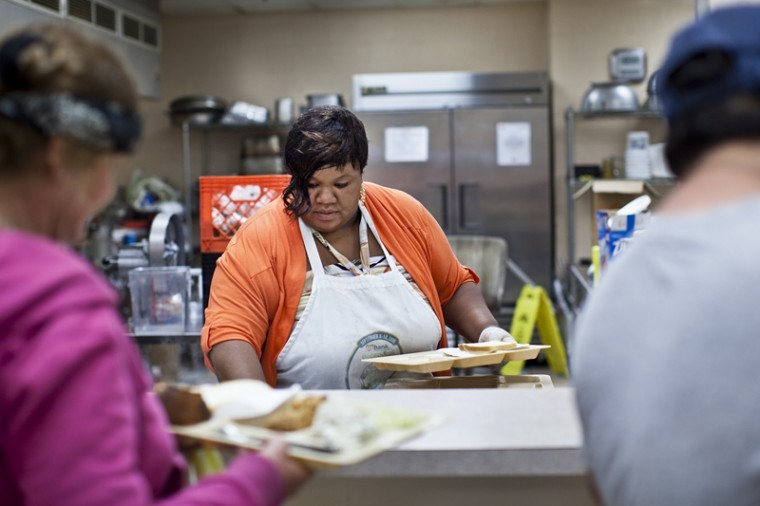WKU graduate volunteers at Salvation Army
September 2, 2011
What began as a requirement for a WKU class has transformed into a way of life for WKU graduate Farrah Yarbrough.
Yarbrough works five days a week serving free meals to the hungry in the soup kitchen at the Salvation Army.
In March, Yarbrough began volunteering at the Salvation Army when a social work course required that the students volunteer 32 hours each week and write a paper about the experience.
Yarbrough graduated from WKU in the spring of 2003 with a bachelor’s degree in business management. She also has an associate degree in office systems technologies.
She has taken classes at WKU since graduating and plans to pursue a master’s degree in social work, a decision she said was heavily influenced by her 3-year-old son, Xzavion.
After completing the class in May, Yarbrough said she quickly figured out that she still wanted to help at the Salvation Army.
“I just wasn’t happy,” she said. “So I asked to come back.”
Yarbrough returned as a volunteer at the Salvation Army and is popular with the people she serves, she said.
“Everyone wants Farrah to serve every day,” she said with a laugh. “I don’t know if it’s because I give extra or if they just love my smile.”
Yarbrough said she loves working in the kitchen because she is able to relate to the people that benefit from the organization.
“I’ve been a paycheck away from being homeless,” she said. “So I can totally relate to the ones that come in here.”
Yarbrough said that being appreciated is also very rewarding.
“That really brightens my day to know that I helped someone out, even if it’s only for today,” she said.
The food supply is limited, and when the kitchen runs out of food, she has to turn people away, which is the hardest part of the job, Yarbrough said.
There are several ways for WKU students, faculty and staff to get involved with the kitchen at the Salvation Army, she said.
A group of WKU researchers have figured out a way to help with the limited food supply.
Becky Gilfillen, an associate professor of agricluture, and a group of student researchers are conducting experiments on tomatoes to see how a fungus called mycorrhizae affects yield, soil quality and more.
The tomatoes grown during the trials are then donated to the Salvation Army kitchen, Gilfillen said.
From working with the Salvation Army, Gilfillen said she has learned it would accept donations of fresh fruit and vegetables.
“The folks who get [the tomatoes] at the Salvation Army typically don’t get fresh fruit and vegetables because they’re expensive,” Gilfillen said.
That and the ability of the students involved and the department of agriculture to give to those in need is a “win-win,” she said.
Gilfillen said knowing that she and her students are helping people in need is special.
“As soon as they put the tomatoes out, everyone runs and jumps on it,” she said. “That’s nice.”
The soup kitchen is open to the public Monday through Friday from 11:30 a.m. to 12:30 p.m., said Heather Gordon, Housing Manager at Bowling Green’s Salvation Army.
The Salvation Army also offers housing to those who need it while space is available, Gordon said.
“Some nights we’re full,” she said. “Other nights we may have 15 people.”
There are several ways that the WKU community can volunteer with the Salvation Army, outside of the kitchen, Gordon said.
The Salvation Army has an Angel Tree Program, it hosts camps for children, works with Atmos Energy and more.














